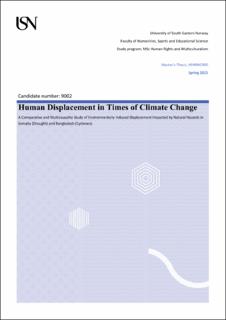| dc.description.abstract | Today, more and more people are forced to flee from their homes as a result of global warming. Migration scholars, environmentalists and international institutions, have all expressed concern over the increasing social effects climate change has on human beings and their livelihood (Black, 2001; Myers, 2002; UNHCR, 2020). This thesis explores the interactions between forces and drivers of environmentally induced displacement in the context of resource-dependent livelihoods and vulnerability. The study draws on a “driver focused” framing of environmental conditions and migration (Black, 2011). It applies the concept of “vulnerability” (McLeman & Smit, 2006) and a “threshold” (Hugo & Bardsley, 2010).
A secondary document analysis is adopted within a comparative case study design. Using the case studies of displaced Somali pastoralists during the 2010/2011 Drought and of the Bangladeshi fishermen and farmers in the aftermath of the Cyclones Sidr (2007) and Aila (2009), this study sheds light on different drivers and vulnerabilities that may come into play in the process of environmentally induced displacement. A re-analysis of previous studies, which this research is based upon, show the complexity of interrelated factors, both environmental and non-environmental, that lead to human displacement. Though climate change may influence these drivers directly and/or indirectly, this study argues that the phenomenon of environmentally induced displacement is not solely an environmental issue. Rather, it is highly interlinked with socio-economic and political causes. | |
